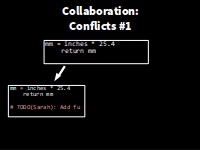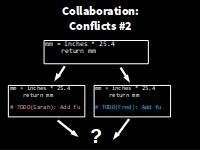Version Control with Git
- Conflicts
Learning Objectives
- Explain what conflicts are and when they can occur.
- Resolve conflicts resulting from a merge.
As soon as people can work in parallel, someone is going to step on someone else’s toes.
This will even happen with a single person: if we are working on a piece of software on both our laptop and a server in the lab, we could make different changes to each copy.
These situations are called conflicts Version control helps us manage these conflicts by giving us tools to resolve overlapping changes.
To see how we can resolve conflicts, we must first create one. The file rainfall_conversion.py currently looks like this in both partners’ copies of our climate-analysis repository:
$ cat rainfall_conversion.py"""A library to perform rainfall unit conversions"""
def inches_to_mm(inches):
"""Convert inches to milimetres.
Arguments:
inches -- the rainfall inches
"""
mm = inches * 25.4
return mmDeveloper A - Modify and Push

Conflicts
Let’s add a line to the bottom of Developer A’s copy only:
$ nano rainfall_conversion.py
$ cat rainfall_conversion.py"""A library to perform rainfall unit conversions"""
def inches_to_mm(inches):
"""Convert inches to milimetres.
Arguments:
inches -- the rainfall inches
"""
mm = inches * 25.4
return mm
# TODO(Developer B): Add function to convert from inches to centimetresand then push the change to GitHub:
$ git add rainfall_conversion.py
$ git commit -m "Developer A added a ToDo"[master 5ae9631] Developer A added a ToDo
1 file changed, 1 insertion(+)$ git push origin masterCounting objects: 5, done.
Delta compression using up to 8 threads.
Compressing objects: 100% (3/3), done.
Writing objects: 100% (3/3), 357 bytes | 0 bytes/s, done.
Total 3 (delta 2), reused 0 (delta 0)
To https://github.com/js-robinson/climate-analysis.git
3973c44..479a5d2 master -> masterDeveloper B - Modify and push without pull
Now let’s have Developer B make a different change to their copy without updating (pulling) from GitHub:
$ nano rainfall_conversion.py
$ cat rainfall_conversion.py"""A library to perform rainfall unit conversions"""
def inches_to_mm(inches):
"""Convert inches to milimetres.
Arguments:
inches -- the rainfall inches
"""
mm = inches * 25.4
return mm
# TODO(Developer A): Add function to convert from inches to centimetresWe can commit the change locally:
$ git add rainfall_conversion.py
$ git commit -m "Developer B added a different line"[master 07ebc69] Developer B added a different line
1 file changed, 1 insertion(+)but Git won’t let us push it to GitHub:
$ git push origin masterTo https://github.com/js-robinson/climate-analysis.git
! [rejected] master -> master (fetch first)
error: failed to push some refs to 'https://github.com/js-robinson/climate-analysis.git'
hint: Updates were rejected because the remote contains work that you do
hint: not have locally. This is usually caused by another repository pushing
hint: to the same ref. You may want to first integrate the remote changes
hint: (e.g., 'git pull ...') before pushing again.
hint: See the 'Note about fast-forwards' in 'git push --help' for details.
Conflicts #2
Git detects that the changes made in one copy overlap with those made in the other and stops us from trampling on our collaborators work.
What we have to do is pull the changes from GitHub, merge them into the copy we’re currently working in, and then push that.
Developer B - Pull and resolve
Let’s start by pulling:
$ git pull origin masterremote: Counting objects: 3, done.
remote: Compressing objects: 100% (1/1), done.
remote: Total 3 (delta 2), reused 3 (delta 2), pack-reused 0
Unpacking objects: 100% (3/3), done.
From https://github.com/js-robinson/climate-analysis
3973c44..479a5d2 master -> origin/master
Auto-merging rainfall_conversion.py
CONFLICT (content): Merge conflict in rainfall_conversion.py
Automatic merge failed; fix conflicts and then commit the result.git pull tells us there’s a conflict, and marks that conflict in the affected file:
$ cat rainfall_conversion.py"""A library to perform rainfall unit conversions"""
def inches_to_mm(inches):
"""Convert inches to milimetres.
Arguments:
inches -- the rainfall inches
"""
mm = inches * 25.4
return mm
<<<<<<< HEAD
# TODO(Developer A): Add function to convert from inches to centimetres
=======
# TODO(Developer B): Add function to convert from inches to centimetres
>>>>>>> dabb4c8c450e8475aee9b14b4383acc99f42af1dOur change—the one in HEAD—is preceded by <<<<<<<. Git has then inserted ======= as a separator between the conflicting changes and marked the end of the content downloaded from GitHub with >>>>>>>. (The string of letters and digits after that marker identifies the revision we’ve just downloaded.)
It is now up to us to edit this file to remove these markers and reconcile the changes.
We can do anything we want: keep the change made in the local repository, keep the change made in the remote repository, write something new to replace both, or get rid of the change entirely.
Let’s replace both so that the file looks like this:
$ cat rainfall_conversion.py"""A library to perform rainfall unit conversions"""
def inches_to_mm(inches):
"""Convert inches to milimetres.
Arguments:
inches -- the rainfall inches
"""
mm = inches * 25.4
return mm
# TODO(all): Hire a new developerDeveloper B - Add, Commit and Push
To finish merging, we add rainfall_conversion.py to the changes being made by the merge and then commit:
$ git add rainfall_conversion.py
$ git statusOn branch master
Your branch and 'origin/master' have diverged,
and have 1 and 1 different commit each, respectively.
(use "git pull" to merge the remote branch into yours)
All conflicts fixed but you are still merging.
(use "git commit" to conclude merge)
Changes to be committed:
modified: rainfall_conversion.py
$ git commit -m "Merging changes from GitHub"[master 2abf2b1] Merging changes from GitHubNow we can push our changes to GitHub:
$ git push origin masterCounting objects: 10, done.
Delta compression using up to 4 threads.
Compressing objects: 100% (6/6), done.
Writing objects: 100% (6/6), 697 bytes, done.
Total 6 (delta 2), reused 0 (delta 0)
To https://github.com/js-robinson/climate-analysis.git
dabb4c8..2abf2b1 master -> masterGit keeps track of what we’ve merged with what, so we don’t have to fix things by hand again when Developer A who made the first change pulls again:
Developer A Pull
$ git pull origin masterremote: Counting objects: 10, done.
remote: Compressing objects: 100% (4/4), done.
remote: Total 6 (delta 2), reused 6 (delta 2)
Unpacking objects: 100% (6/6), done.
From https://github.com/js-robinson/climate-analysis
* branch master -> FETCH_HEAD
Updating dabb4c8..2abf2b1
Fast-forward
rainfall_conversion.py | 2 +-
1 file changed, 1 insertion(+), 1 deletion(-)we get the merged file:
$ cat rainfall_conversion.py"""A library to perform rainfall unit conversions"""
def inches_to_mm(inches):
"""Convert inches to milimetres.
Arguments:
inches -- the rainfall inches
"""
mm = inches * 25.4
return mm
# TODO(all): Hire a new developerWe have resolved the conflict
We don’t need to merge again because Git knows someone has already done that.
Version control’s ability to merge conflicting changes is another reason users tend to divide their programs and papers into multiple files instead of storing everything in one large file. There’s another benefit too: whenever there are repeated conflicts in a particular file, the version control system is essentially trying to tell its users that they ought to clarify who’s responsible for what, or find a way to divide the work up differently.
Reverse
Now, Each add another line and Developer B push first. Developer A resolves the conflict Get yourselves back in sync
Conflicts on Non-textual files
What does Git do when there is a conflict in an image or some other non-textual file that is stored in version control?
